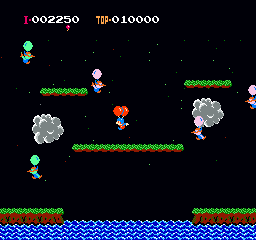
Thus far this has been a blog about playing video games. That necessarily changes now, for the simple reason that I did not in any meaningful sense play any of these three video games. More accurately, I stared at each of them in frustration. For the appointed half hour. Unable to make them work right. At all. For three different reasons.
First we have Bandai Golf Challenge Pebble Beach. This is a golf game. I am not very good or very fond of golf games, but I do understand the basic mechanism - you hit golf balls with golf clubs towards holes on golf courses. It is that verb at the beginning, hit, where this game goes terribly wrong for me, because half an hour of trying yields only swinging my club in the air like I'm Craig Bellamy. (One of you, if that, understood that reference. You are welcome.)
Not playing a video game is a strange experience. By this I mean actively not playing - the sort of not playing that requires an extended sit-down with the game. It is sort of like playing cards, only when your turn comes you sit, stupefied, staring at your cards realizing you have absolutely no idea what is going on. And none of the other players tell you what you should do. Or even comment to complain that you're doing it wrong. They just look at you, puzzled, silently judging you.

Bandit Kings of Ancient China manages to reveal a lot with its title. Video game titles have a strange art to them, as we have already seen. This title is a satisfying exhaustive list of the contents of the game. Bandit Kings. Ancient China. It does not describe what these Bandit Kings are going to do, and yet there is somehow a sort of suggestion there. One has the funny feeling that the Bandit Kings might not all get along. Though to be fair, I never made much of this, because Bandit Kings of Ancient China is a genre of game that is, shall we say, not my favorite - turn-based strategy.
This is strange of me, I know. Mostly because strategy games have some of the most interesting depth and nuance of any genre of games. The problem is that, frankly, I like to pick up my games and play them. This is a huge problem with modern video games, where there are often 10, 15, even 30 minutes of gameplay before you get to the part that is advertised as fun. This generally happens when one inadvertently crosses from rewarding success to punishing lack of success. It is one thing to make the final level of the game an epic series of jumps and dodges that puts everything before it to shame. It is another to make the first level a boring, turgid drag.
That is to say, the games willfully suck for a while to make you earn the fun. To my mind, I earned the fun when I handed $50+ to the nice man at Gamestop. Now pay me my fucking fun.
The problem with strategy games is that, by their nature, they have a very slow ramping up. They require a lot of dedicated learning of controls and interactions, slowly yielding up additional pleasures and nuances the more you play them. They are the fine wines of video games. I respect them. When I enjoy them, I enjoy them for decades. (Literally. I will still play Civ 2 happily and eagerly.) But man, the tannins on that first sip are a hurdle. And so I readily admit - Bandit Kings of Ancient China may be a great game. That great game does not take place in the first 30 minutes of play, however.
And then there is Barbie. I would be lying if I said I had high hopes for Barbie. And that lack of hope was well rewarded. Here is a complete inventory of what I did in Barbie within the first
30 minutes of play.

- Encountered a sentient tennis racket that hurt me if I walked past it and was undodgeable.
- Encountered a second similar tennis racket.
- Encountered a wall of boxes I couldn't jump over.
That's all I've got for you there, really.





